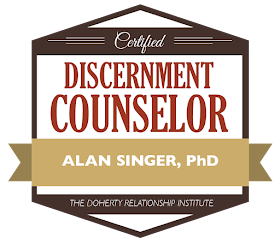This essay was published in the Home News Tribune last year on 02/28/06. It is not your average marriage and family topic. In fact, it deals with the worst possible tragedy; having a child murdered. My college classmate Arnold Roth is featured here and in honor of his visit to the U.S. this week, I posted this to the blog. It is an article about resilience and determination in the face of tragic loss.
As a master's degree student, I studied women in their 80s who had lost middle-age children. My research revealed that whether one's child dies in infancy or as a grandparent, the loss is unnatural and catastrophic. When the unimaginable happens, what comfort can one give to the parents?
The Jewish ritual mourning process designates time periods for reflecting on the full life and accomplishments of the deceased, and through this process the mourner heals. This cannot apply in the same way for the death of a young child. A child preceding a parent in death is simply unnatural; children bury their parents and mourn for them, not the other way around.
In my research, I discovered that being surrounded by supportive family and friends is likely the most important factor in how a mourner copes with tragedy. Another important factor is whether the mourner is able to "ventilate," releasing the pain he or she feels inside. Level of activity also plays an important role in healing. Active mourners not only are productive, but they also provide themselves with a distraction from the sorrow.
Beyond these factors, however, I discovered that among the group of elderly women, those who dealt with mourning a child most successfully were those who had a goal or flag that gave them something to live for. In the final or "acceptance" stage of mourning, this flag became a symbol of pride and identity that gave each woman the strength to wake up in the morning. To Ida, her grandchildren were her reason for living. To Shirley, it was her religious convictions, and for Betty, her inspiration and motivation came from a myriad of craft-making hobbies.
During the current intifada in Israel, far too many parents have suffered the loss of a child. The situation is unspeakable; how are these parents to cope? I met two Israeli fathers who are mourning their children when I recently visited Israel. Boaz Shabo lost his wife and three sons who were murdered in Itamar, leaving him alone to raise four other children. Arnold Roth lost his precious Malki, aged 15, among the 15 murdered at Sbarro's in August 2001. As I listened to their stories, I mourned with them. And I noticed a pattern in their response to suffering.
I would not have been surprised to learn that Boaz Shabo, as head of the household and protector of his family, cried out for revenge and retaliation. Would he not have been justified in organizing a call to arms? Nor would I have been surprised had he withdrawn from society, even resorting to alcohol or drugs. Internalizing misery and grief is certainly a common response to tragedy. But Mr. Shabo picked himself up from the floor of mourning and became a builder of institutions. He now works tirelessly for Hakav Hamached, an organization that assists young cancer patients and other terminally ill children, as well as for the Children of Terror Foundation, which gives children that have lost family members a respite in summer camp.
Arnold Roth responded similarly. And perhaps I find his ability to rise beyond his pain the most moving because he and I were classmates in college 28 years ago. He moved to Israel with his family in 1988, and they all paid an exorbitant price for their commitment to the Jewish homeland. Nonetheless, he told me, he and his family have never regretted their decision to move to Israel.
Malki was a gifted musician who played the classical flute. A devoted sibling, she was deeply involved in the care of her blind and severely disabled sister, Haya Elisheva. In memory of their daughter, Arnold and his wife Frimmet founded Keren Malki (the Malki Foundation
http://www.kerenmalki.org/), an organization that provides special equipment to both Israeli and Arab families who care for children with severe disabilities at home, as members of the nuclear family. Like Mr. Shabo, Arnold did not take "Revenge!" as his mantra; instead, he sought to make the world a better place for others.
And so the generally advisable cliche of "when life gives you lemons, make lemonade" is particularly poignant in Israel today. The motto becomes: "When life hands you unspeakable tragedy, lift yourself up and build anew." At a time when each of these fathers was near-broken from his own loss, he embarked upon Tikkun Olam, fixing the world. Perhaps this building is their goal or flag that helps them cope.
If you rearrange the letters of the Hebrew word for sadness, you create the word window, a source of light. Through pain, one can see into the distance. In grief, one can gain outstanding insight.
Be Counted columnist Dr. Alan Singer blogs at
www.familythinking.com and is a marriage therapist in Highland Park. He can be reached at
DrAlanSinger@aol.com.



 Saving Marriages Strained By The Recession
Saving Marriages Strained By The Recession Does size matter? For today's families it does
Does size matter? For today's families it does Shaky Economy Means Bye-Bye Baby for Some
Shaky Economy Means Bye-Bye Baby for Some

